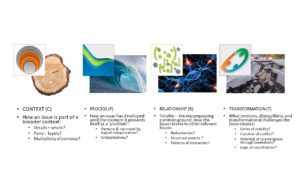For anybody who has worked with teams or larger groups — including teams thinking of themselves as ‘agile’ — it’s clear that team members don’t often consider that what ultimately makes them ‘agile’ is the quality of their dialogue. The importance of real-time dialogue has to do with the fact that thinking precedes action, and speaking precedes doing. Dialogue quality is mainly a matter of the concepts team members bring forward and articulate in their dialogue, and these concepts are different at different levels of team work. Concepts, abstract and therefore multi-dimensional and ambiguous as they are, ‘mean’ different things for people active at different levels of work complexity; one and the same concept even means something different for different individuals in function of their specific level of adult cognitive development. As a result, no verbal statement can ever be accept as ‘the truth’.
Even less considered, especially in ‘visionary’ designs, is that every person is viewing the world from his/her own present COGNITIVE PROFILE which is part of a larger ‘developmental profile’ of the person. Empirically, this profile can be accurately assessed through DTF, the Dialectical Thought Form Framework, also for gauging a person’s capacity of listening to others for more than the content of what they say. This ‘other’ aspect to listen for in what you hear or read is the conceptual, or ‘thought form’, structure of what is internally and externally said, written down, broadcasted, twittered, etc.
You do all of your work and compose your life on the basis of your present cognitive profile.
This profile makes predictable what you can and cannot do, see and cannot see, imagine and cannot imagine, and thus also what you endlessly repeat without ever getting an opportunity to change it into something more adequate in view of how reality works. Even without ‘conflicting commitments’ (Kegan), which are merely social-emotional, you are in for rough awakenings …
***
In organizations and institutions, these seemingly ‘philosophical’ issues pose very real problems, including the problem of how to keep a company or institution alive.
The key to understanding these issues, in our view, lies in taking note of empirical findings about adult development and their consequences for human dialogue. In our 2018 book entitled Dynamic Collaboration, Jan De Visch and I show in detail how one can help a team to become more conceptually agile and thereby add value to one’s team’s work, by focus on a team’s quality of dialogue. We do this in two steps.
First, we teach team members two important facts:
1. that they are actually ‘making sense’ of the world all the time, in a way inseparable from their breathing — this is what is ‘dynamic’ about collaboration
2. that what team members ‘say’ has a conceptual structure that can be improved to understand more precisely ‘how the real world works’.
Based on these two “facts”, we then:
a. teach ways to become aware of the concepts team members are presently using
b. point to the concepts, or aspects of concepts, that are missing from team members’ discourse (e.g., process thinking, seeing relationships, grasping transformations)
c. show how to integrate a broader, more complex set of concepts into real-time meetings
d. demonstrate how to become better listeners to each other, to discern how shallow or complex are the focal concepts team members use.
We call this way of working with teams CRITICAL FACILITATION (of teams), a form of cognitive coaching. Our work is based on DTF, the Dialectical Thought Form Framework which views concepts as comprising 4 separate but linked ‘dimensions’: Context, Process, Relationship, and Transformation, visualized below.
Each of these dimensions is associated with a small, learnable number of ‘thought forms’ into which the four dimensions depicted unfold, to provide ‘mind openers’ for team discussions and group communication, — even the design of digital platforms and templates.
You might want to learn from us! We can show you that the much praised ‘templates’ and ‘platforms’, ‘stand-up’ and ‘Theory-U’-meetings’ by themselves don’t make much difference, — only thinking with an awareness of the thought-form structure of one puts out in such meetings and into platforms does.
Take a look at this new, real-time, cognitively focused, approach to team efficiency and team cohesion, as well as group effectiveness, at
